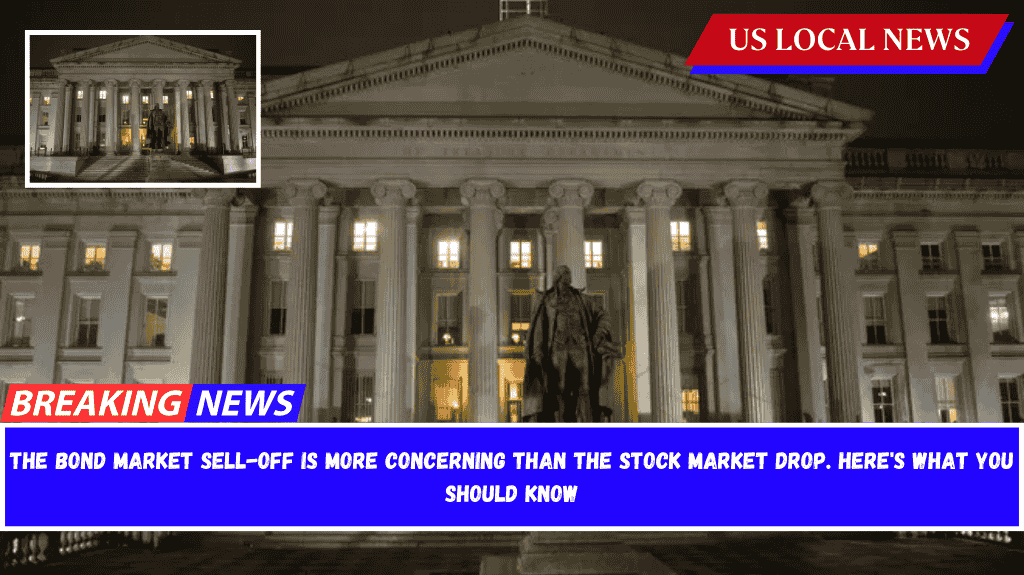United States government bonds are a one-of-a-kind type of financial asset that has long served as the foundation of many parts of the world’s financial system due to their low risk and high demand.
The creditworthiness of Washington and the strength of the world’s most powerful economy make American bonds and notes so appealing to foreigners that they own nearly one-third of all outstanding Treasury securities.
Investors are concerned as a result of a recent sell-off in that sector of the market.
The 10-year Treasury note has gained about 50 basis points in the last week, and some one-day moves for several bond maturities have been among the highest in decades, according to various reports.
“I tell clients that we can look at the bond market as a harbinger of economic anxiety, and when the bond market speaks, the stock market reacts,” said Vance Barse, founder of Your Dedicated Fiduciary, a national financial advisory firm. “The typical investor focuses on the stock market but institutional investors look to bonds for a pulse on the market.”
Bond yields (rates) and prices move in opposite directions, so the recent sell-off has pushed yields higher. Another way to think about this relationship is that when bonds become more appealing, their prices rise, and the debt issuer has less incentive to entice investors by offering a higher interest rate. In contrast, in this environment, the United States government, and thus taxpayers, will have to pay more.
What is ‘forced selling’ in financial markets?
One of the concerns about the recent market decline is that stocks and bonds tend to move in opposite directions. When the economy slows, investors tend to avoid stocks in favor of bonds, which are more reliable. When different types of assets move in tandem, it indicates a deeper fissure in financial markets.
The initial response to President Donald Trump’s tariff announcement on April 2 was more traditional, according to Thomas Urano, chief strategist at Austin-based Sage Advisory, a fixed-income manager with $28 billion in assets.
“Everyone was worried about a recession,” Urano explained, so investors piled into bonds, lowering yields. However, as stocks continued to fall, things became messy.
“When everybody starts to sell at the same time, prices get very choppy,” Urano told reporters. Traders struggle to determine the optimal prices for various assets and how much risk should be assigned to each. “It kind of leads to mass chaos,” he explained.
In some major market crashes, large investors may be forced to sell assets they did not intend to sell simply to raise funds. According to Jon Adams, chief investment officer of $4.1-billion Calamos Wealth Management, there have been reports of “forced selling” in recent months.
These types of market seizures are uncommon but not unheard of. Analysts cite two examples: the panic in March 2020, when the world’s governments considered shutting down their economies for the first time in modern history, and the depths of the 2008 financial crisis.
But one of the most significant differences between now and then is that the current sell-off is entirely the result of the Trump White House’s intentional trade war. Many of the traditional tools for dealing with financial crises, including Federal Reserve intervention, will not help and should not be relied on.
Urano stated that the Fed is not only unwilling to be perceived as taking sides, but that its tools are also inappropriate for the current situation. “Lowering rates is not going to change what’s happening on the policy side.”
Why do budget deficits matter to the bond market?
Many market participants are concerned that the bond rout will continue if the United States loses some of its long-term credibility.
The bond sell-off “really could be about default risk,” according to Matt Fabian, a partner at Municipal Market Analytics, a bond market research firm. “This could indicate something about the US government’s ability to function. There are numerous reasons to be concerned about the government as a going concern.
Even if officials do not explicitly refuse to honor U.S. government obligations, the likelihood of a technical blunder has increased dramatically as a result of the “gutting” of workers and processes in Washington, Fabian noted.
Furthermore, the Republican budget currently being debated in Congress will add trillions of dollars to the amount of debt we owe, as deficits are financed through borrowing. It’s “a horrific budget trajectory,” according to Fabian.
Meanwhile, bond market volatility makes long-term planning nearly impossible for businesses and households. Adams told USA TODAY that volatility could eventually “become self-fulfilling” and tip the economy into a downturn.
“I think if confidence was dented enough, uncertainty was high enough, individuals and businesses put off decisions long enough, that could cause a recession.”
Overall, recent events have many analysts recalling the bond market’s reputation as a predictor of future events. “It’s difficult to imagine this ending well,” Fabian said.


















Leave a Reply